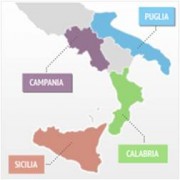Convergence Regions
The “Convergence” objective comprises the countries and regions with a delayed development. The regions present in this objective are the ones whose per capita gross domestic product (GDP), measured with the same purchasing power, is below 75% of the average.
The European Union and Italy have decided that a consistent portion of the resources of the European structural Funds should go to support research and innovation activities in the 4 Regions of the “Convergence” Objective (Puglia, Calabria, Sicilia, Campania), so that to make them a source of social and economic development.
Regulation (CE) n.1083/2006 of the Commission, on 7/11/2006, bearing general regulations on the European regional development Fund, on the European social Fund and the cohesion Fund which amends Regulation (CE) n. 1260/1999 – n. 17.
The National Operation Program “Ricerca e Competitività” (Research and Competitiveness) 2007-2013 (PON “R&C”) is a tool with which Italy contributes to the development of the Cohesion Politics of the European Union in favor of its most disadvantaged areas.
Objectives
- Strengthening of the observation network for the climatic-environmental monitoring (atmosphere, agricultural, forestry, coastal and maritime ecosystems) and monitoring of the infrastructures of data processing and storage in the Convergence Regions.
- Strengthening and implementation of infrastructures dedicated to the development of instruments, new sensors, cloud computing platforms.
- Implementation of a “Scientific & Technological Lab”, for the development of sensors and instruments.
- Implementation of monitoring and technological development infrastructures inside international initiatives, projects and programs in the climatic-environmental field.
- Acquisition of measures and information on air quality, climatic system, agro-forestry and coastal ecosystems.
- Development of system analysis, integrated processing and forecast with the information acquired over the observation network, so that to provide regional and local administrations with tools for the management of environment issues (for instance air quality, forest fires, changes in coastal ecosystem, salt-wedge meddling, wind energy production, …).
- Training of highly qualified technical, scientific, managing and technical-administrative personnel.








